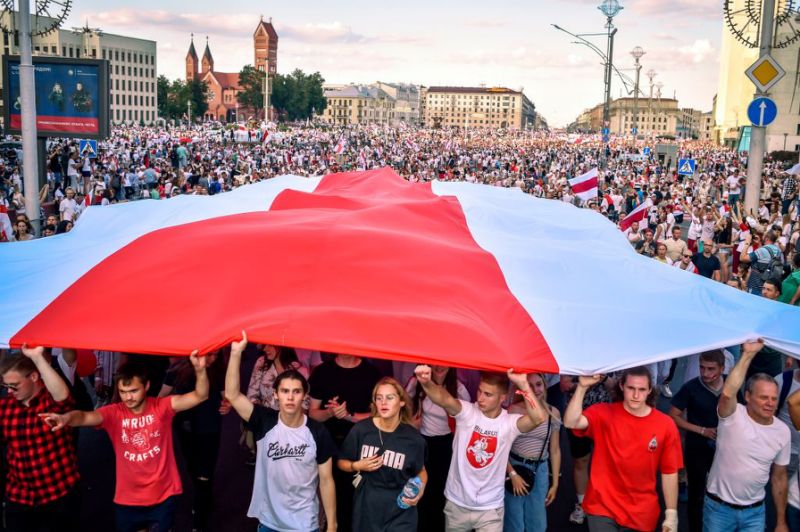
The 2020 “Belarus Awakening” came as a surprise to many international observers, the regime and probably to the citizens themselves. Following the rigged presidential elections, hundreds of thousands of people took to the streets in an impressive display of spontaneous mobilization and solidarity. It soon became commonplace to say that a new civic nation was born under the historical white-red-white flag that came to represent the quest for freedom of the Belarusian people from authoritarianism, physical abuse, and torture that the regime started using massively against its own people.
Aliaksandr Lukashenka, who had ruled the country for more than quarter of a century, suddenly discovered that he had lost legitimacy and millions of people no longer regarded him as the lawful President of Belarus. And while election rigging, protests, and brutal crackdowns are nothing new for this post-Soviet country, this time the scale of the events is absolutely unprecedented. It looks like in August 2020, Belarusians finally started making their own history.
The history of modern Belarus begins in the early 20thcentury. As the empire of the Russian Tsars collapsed following World War I, the Belarusian national movement proclaimed its first independent republic, (the Belarusian Democratic Republic) in 1918. Its symbols, the white-red-white flag and Pahonia,the coat of arms (a charging knight with an Anjou cross on the shield), referred back to the historical period of the Grand Duchy of Lithuania and the Polish-Lithuanian Commonwealth in which Belarusian lands played a key role prior to their absorption into the Russian empire in the late 18thcentury. Sadly, the 1918 independence was short-lived and the newly born republic was eventually partitioned between the Bolshevik Russia and Poland under the Riga Peace Treaty of 1921. During the Communist period, Belarus enjoyed formal sovereignty as one of the Soviet Socialist Republics of the Union – in that capacity, it was even officially a founding member of the United Nations. Actual independence, however, did not arrive until 1991, when the Soviet Union collapsed under the weight of its problems.
While its neighbors aspired to become members of the EU and NATO, Belarus quickly became known as “Europe’s last dictatorship”.
Independent Belarus faced various problems and challenges during the 1990s that were typical for most of the post-Communist states going through transition. However, the 1994 election victory of the authoritarian populist Aliaksandr Lukashenka made the country an outlier in East-Central Europe. While its neighbors aspired to become members of the EU and NATO, Belarus quickly became known as “Europe’s last dictatorship”. Lukashenka changed the constitution, installing one-man rule in the country, replacing the historical state symbols with renewed Soviet ones (the official red-green flag was introduced in 1951 under Stalin), and proclaiming a close union with Russia.
None of the elections or referenda organized under Lukashenka were recognized as “free and fair” by the international community. Yet, he received strong backing from Moscow. Russia’s post-imperial complexes and its growing anti-Western sentiment allowed the Belarusian dictator to manipulate the Kremlin into supporting him economically and politically. Lukashenka presented himself as Russia’s last and only ally, the guardian of Russia’s Western frontier against NATO. Despite the official rhetoric of “brotherhood”, however, the relationship between Moscow and Minsk was far from smooth. Apparently, after the 2008 Russo-Georgian war, Lukashenka understood that a stronger and more aggressive Russia was a dangerous neighbor and tried to balance against it by developing cooperation with the West. Importantly, Belarus joined the EU’s Eastern Partnership program in 2009.
The policy of engagement that the West pursued towards the regime brought limited results. All political power in the country continued to rest with one person, and Lukashenka refused to implement reforms that would make Belarusian economy more competitive and less dependent on Russian subsidies. In 2015, Belarus was forced to become part of Putin’s Eurasian Economic Union, which effectively blocs deeper economic integration with the EU. In the runup to the 2020 presidential elections, Minsk experienced strong pressure from Moscow to pursue incorporation of Belarus into Russia. For Lukashenka ceding power to anyone has always been psychologically impossible, and though, for many years, he has paid lip service to the idea of “integration”, in practice, he resisted transferring real sovereignty from Minsk to Moscow.
The 2020 Belarus Awakening seems to have caught both the official Minsk and Moscow by surprise. The grassroot political movement swept across the country, from the capital to small towns, drawing in people from various social strata and age groups. Workers of large factories going on strike turned out to be a particularly unpleasant surprise for the regime as it has long tried to buy their loyalty by postponing difficult economic reforms and using Russian subsidies to sustain an illusion of social stability and limited economic growth. (In truth, the “welfare state” which that the regime has boasted for years had to undergo radical cuts and draconian neoliberal measures were introduced, such as abolition of senior and student discounts, and a system of short-term working contracts combined with systemic repression against independent trade unions).
Retrospectively, one can identify several factors that probably contributed to the buildup of social frustration in the country. First, there was continued economic stagnation and impoverishment, as the regime repeatedly failed to deliver on its so-called “social contract” with the population, i.e. political loyalty/non-participation in exchange for relative stability, economic growth, and modest but regular paychecks.
Second, it seems that Lukashenka angered many people -including his previous supporters- with his reckless and cynical COVID-19 denialism. As people feared for their lives, he went on publicly about how it was their own fault if they died, and how sauna and a shot of vodka should have been enough to prevent infection. According to some, grassroot mobilization that fueled the protests had its roots in the collective action that Belarusians undertook to provide their own COVID-19 prevention measures.
Third, many people were simply growing tired of the same ageing face that they had been seeing for over a quarter of a century. Finally, it seems, many were shocked by brutal repression and what they saw as an outright theft of their vote. While neither election rigging nor violent crackdowns were a stranger to Belarus, this time the scale became truly unprecedented. According to the United Nations human rights experts, there were at least 450 registered cases of torture and other ill-treatment in custody in the wake of the August protests.
On a positive note, the grassroot activism of the protests signals the birth of a new civil society in Belarus, a community of people who are enthusiastic, brave, creative, and unwilling to exchange their political rights and freedoms for the illusion of authoritarian stability. The historical white-red-white flag has made a triumphant comeback, and, as many are now arguing, symbolizes the arrival of a new Belarusian civic nation. The official red-and-green flag, on the other hand, increasingly comes to represent only Lukashenka and his project of authoritarian stability which has gone bankrupt.
These social processes seem to be running deep and irreversible, though much remains unclear as to what role the external actors can play. Putin’s Russia is traditionally wary of what it sees as anti-Russian “color revolutions” in its neighborhood. Though the protestors never spoke out against friendly relations with Russia, the Kremlin has already committed itself to supporting Lukashenka. While many international observers try to grasp the situation in Belarus through comparisons with revolutions in either Ukraine (2013) or Armenia (2018), these analogies are unhelpful and create more confusion than understanding. For instance, unlike Belarus, Armenia has powerful adversaries among its neighbors and is bound to Russia as its primary “security provider”. For Belarusians taking the European path would be much easier – if it was not for the fact that they were already deeply locked into the Eurasian Economic Union and other forms of Russian sponsored pseudo-multilateralism. However, one thing is clear; the Belarusian civil society has arrived on stage as a (geo)political player in its own right. “We have woken up” the protestors’ banners now read, “and we aren’t going back to sleep”.
_______________________________________________________________________________________________

Dr. Aliaksei Kazharski, is a lecturer and researcher at Charles University in Prague and Comenius University in Bratislava. His research focuses on international relations in Central and Eastern Europe, and his recent publications include “Belarus’ entry into international society. Between a small nation-state and big narratives” and “The End of ‘Central Europe’? The Rise of the Radical Right and the Contestation of Identities in Slovakia and the Visegrad Four”.
To cite this work: Aliaksei Kazharski, “Belarus: “We have woken up and we aren’t going back to sleep”, Panorama, Online Publication, 10 September 2020, https://www.uikpanorama.com/blog/2020/09/10/belarus-we-have-woken-up-and-we-arent-going-back-to-sleep/
Copyright@UIKPanorama.All on-line and print rights reserved. Opinions expressed in this work belongs to the author(s) alone, and do not imply endorsement by the IRCT, the Editorial Board or the editors of the Panorama.


